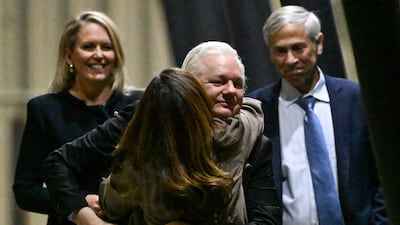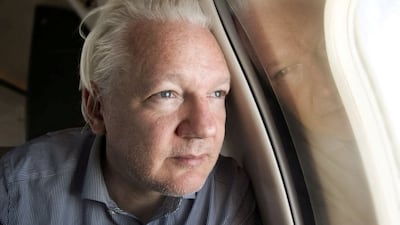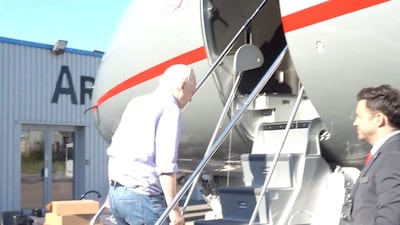WikiLeaks founder Julian Assange arrived in Australia on Wednesday after walking free from a court in a US jurisdiction in the Pacific following a deal that saw him plead guilty to a single count of conspiracy to obtain and disseminate national defence information.
Assange's plane touched down in the country's capital Canberra in the final act of an extraordinary few days following his dramatic release from a London prison.
He was met by his wife Stella, children Gabriel and Max, father John and other members of his family.
Assange spent more than five years in a British high-security jail and seven years in asylum at the Ecuadorean embassy in London battling extradition to Sweden on sexual assault allegations and to the US, where he faced 18 criminal charges.
Those charges stemmed from WikiLeaks' release in 2010 of hundreds of thousands of classified US military documents on Washington's wars in Afghanistan and Iraq – one of the largest breaches of secret information in US history.
American prosecutors claimed that he conspired with former Army intelligence analyst Chelsea Manning to obtain the records and published them on WikiLeaks without regard to national security, including by releasing the names of sources who provided information to US forces.

“Guilty to the information,” Assange said in the federal court in Saipan, the capital of the Northern Mariana Islands, a US jurisdiction in the Pacific, which was chosen because of Assange's unwillingness to go to the mainland and its closeness to Australia.
During the three-hour hearing in Saipan, Assange pleaded guilty to one criminal count of conspiring to obtain and disclose classified national defence documents but said he had believed the US Constitution's First Amendment, which protects free speech, shielded his activities.
“Working as a journalist I encouraged my source to provide information that was said to be classified in order to publish that information,” he told the court.
“I believed the First Amendment protected that activity but I accept that it was … a violation of the espionage statute.”
Chief US District Judge Ramona Manglona accepted his guilty plea, noting that the government indicated there was no personal victim from Assange's actions.
She wished Assange, who turns 53 on July 3, an early happy birthday as she released him due to time already served in a British jail.
While the US government viewed Assange as reckless for putting its agents at risk of harm by publishing their names, his supporters hailed him for promoting free speech and exposing war crimes.
“We firmly believe that Mr Assange never should have been charged under the Espionage Act and engaged in (an) exercise that journalists engage in every day,” his US lawyer, Barry Pollack, said outside the court.
“We know that they were newsworthy, we know that they were quoted by every major media outlet on the planet. And we know that they revealed important information – that is called journalism," he added.
“The United States prosecuted that, they exposed Mr Assange to 175 years in prison. That is what has a chilling effect. Today, a decision that it’s time for Mr Assange to go home, that doesn’t have the chilling effect.
“The chilling effect is the United States pursuing journalism as a crime. I hope this is the first and last time that ever occurs.”
He said WikiLeaks' work would continue.
Jennifer Robinson, legal counsel for Assange, described his release as a “historic day”, saying the case set “a dangerous precedent” which should be a “concern” to journalists and people around the world.
Assange arrived at court shortly before the hearing was to begin, wearing a dark suit with a tie loosened at the collar, and entered the building without taking questions.
He was released on Monday from a high-security British prison.
Julian Assange released - in pictures
Although the deal with prosecutors required him to admit guilt to a single felony count, it also permitted Assange to return to his native Australia without spending any time in a US prison.
He has been banned from entering America without prior approval as part of his plea deal.
Assange left the court through a throng of TV cameras and photographers without answering questions, then waved as he got into a white SUV.
He left Saipan on a private jet to the Australian capital Canberra, where he is expected to land around 7.30pm local time.
His wife, Stella, whom he met in the Ecuadorean embassy, wrote on X: “Julian walks out of Saipan federal court a free man. I can’t stop crying.”
“That Julian can come home to Australia and see his family regularly and do the ordinary things of life is a treasure,” his father, John Shipton, said in Canberra.
“The beauty of the ordinary is the essence of life.”
Prime Minister Anthony Albanese said he is “pleased” the WikiLeaks founder is on his way to “reunite with his family”.
In a statement he said: “Over the two years since we took office my government has engaged and advocated including at leader level to resolve this.”
Mr Albanese said the federal government will continue to provide Assange with consular assistance as he settles into life in Australia.
“This is what is standing up for Australians around the world look like,” Mr Albanese said.









